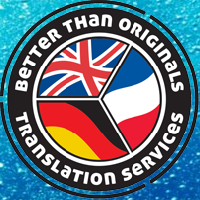Linguistics for translators and interpreters Initiator des Themas: Jpinosil
|
|---|
Jpinosil 
Vereinigte Staaten
Local time: 01:18
Englisch > Spanisch
+ ...
How much linguistics knowledge should one bring to (1) translation and (2) Interpretation practice? Would for instance knowing the difference between Sintax and Pragmatics help to read the source text and write and revise the target text? For those out there who do not have linguistics training, do you feel there is a need for investing time in said training?
| | | | ATIL KAYHAN 
Türkei
Local time: 11:18
Mitglied (2007)
Türkisch > Englisch
+ ...
| Grammar vs. Linguistics | Apr 24, 2014 |
I studied both Turkish and English grammar when I was in high school in Turkey. Unfortunately, I forgot most of that information. It may still be in my subconscious though. Other than that, I have not studied linguistics. Since I have not studied it, it is hard for me to guess whether linguistics is helpful or not. However, my instinct tells me that it is not really helpful. Therefore, I currently do not think of investing in linguistics training.
| | | | jyuan_us
Vereinigte Staaten
Local time: 04:18
Mitglied (2005)
Englisch > Chinesisch
+ ...
| Linguistics could be helpful but | Apr 24, 2014 |
it might not be more helpful than sociology, psychology or Anthropology to a translator. Lack of training in Linguistics would not prevent someone from becoming a great translator. Some knowledge in Pragmatics might make a translator be more aware of social context but the translators who have no idea about what Pragmatics is could still translate very well.
| | | | Phil Hand 
China
Local time: 16:18
Chinesisch > Englisch
| Linguistics is a big field | Apr 25, 2014 |
I certainly think that knowing more about language is always a good thing for a language professional. It helps give us vocabulary and concepts to describe and generalize our experiences. However, a lot of formal linguistics doesn't have anything to do with interpreting or translation. It's a fascinating subject in its own right, and I'd encourage anyone to study it, but a good translation studies course will extract and present the parts of linguistics that are relevant to translation. So for p... See more I certainly think that knowing more about language is always a good thing for a language professional. It helps give us vocabulary and concepts to describe and generalize our experiences. However, a lot of formal linguistics doesn't have anything to do with interpreting or translation. It's a fascinating subject in its own right, and I'd encourage anyone to study it, but a good translation studies course will extract and present the parts of linguistics that are relevant to translation. So for professional purposes I'd suggest translation studies over linguistics, and interpreting courses over translation studies.
I know some will disagree with this, but my interpreting course was the best thing I ever did for my translation practice. It gave me a whole new way of looking at texts, and I'd recommend it wholeheartedly even for those who don't want to be interpreters. ▲ Collapse
| | |
|
|
|
Frankie JB
Frankreich
Englisch > Französisch
+ ...
| Linguistics / translatology / (comparative) stylistics | Apr 25, 2014 |
I'm on the same wavelength as Phil, apart from his stance on interpreting > translation (I suggest that your interpreting teacher was simply better than your translation teacher Phil, or at least a more efficient conceptualizer! . .
I'm not an interpreter so I can't answer your question (2).
I studied a bit general linguistics (incl. De Saussure's work) and I don't think it's very useful for translation in pr... See more I'm on the same wavelength as Phil, apart from his stance on interpreting > translation (I suggest that your interpreting teacher was simply better than your translation teacher Phil, or at least a more efficient conceptualizer! . .
I'm not an interpreter so I can't answer your question (2).
I studied a bit general linguistics (incl. De Saussure's work) and I don't think it's very useful for translation in practice. At some deep level it may help indeed, but it's modest. Some sub-fields must be more useful than others obviously - pragmatics may be one of them but I'm not qualified to tell. Anyway, if you are looking to refine your linguistic senses or become a better translation diagnoser, my best recommandation is stylistics, or better yet, comparative stylistics. In my view every translatology curriculum should include some measure of it. ▲ Collapse
| | | | Ala Tolos
Litauen
Local time: 11:18
Englisch > Litauisch
+ ...
| Translation studies are more valuable | Apr 27, 2014 |
Phil Hand wrote:
So for professional purposes I'd suggest translation studies over linguistics.
I agree with Phil, I had several courses in linguistics, separately studying some of its branches, both in my BA (translation studies) and MA, but there is not much benefit from it for a translator. The most valuable courses that I had at the universities were Translation Practice, Lithuanian Language Norms (since I translate into Lithuanian), course on revision, and a second foreign language. We also practiced working with CAT tools, such as Trados, which is one the most important things to be learned in translation studies programme. However, I do think that, as in schools, university must offer general subjects as well, this is why a BA study programme for translators must include linguistics in the first and second year. For further development of translators linguistics is unnecessary and time-consuming.
| | | | Ty Kendall 
Vereinigtes Königreich
Local time: 09:18
Hebräisch > Englisch
| Opposing view | Apr 27, 2014 |
I'm going to (respectfully) disagree with some of the posters above. I generally agree with Phil when he says "knowing more about language is always a good thing for a language professional", but I also agree that many sub-disciplines within linguistics may be of less use than others (I'd say syntax, morphology and semantics are probably more use to those working with non-spoken/written language than pragmatics or phonology for example).
| | | | Jpinosil 
Vereinigte Staaten
Local time: 01:18
Englisch > Spanisch
+ ...
THEMENSTARTER | Linguistics analysis at play | Apr 27, 2014 |
I argue that linguistics training is essential to the T&I profession, especially in times when all professions and disciplines are in constant flux and language changes occur at unprecedented pace. Take English for example. The sentence "I am so going to google you" is very often heard now. The word "google" in the sentence is new to many but to college students it is as old as their first baby pictures. What do simultaneous translators do with that word? What is the equivalent in our target... See more I argue that linguistics training is essential to the T&I profession, especially in times when all professions and disciplines are in constant flux and language changes occur at unprecedented pace. Take English for example. The sentence "I am so going to google you" is very often heard now. The word "google" in the sentence is new to many but to college students it is as old as their first baby pictures. What do simultaneous translators do with that word? What is the equivalent in our target language? What is the appropriate equivalent?
Then, let's look beyond words. Is the utterance a threat? An ice-breaker? A friendly comment in the heat of a business conversation? A filler thrown in intended to gain time? As decision makers we know that by entering the contextual information in which the sentence was uttered, the body language, the semantic load, the tone (phonology), the reaction of the actants, in the pre-decision analysis, we may opt for providing the best possible equivalent or even omit it altogether. The brain makes the decision in no time. The psycholinguistic process preceding the choice is there. There is then little chance that only interpretation strategies may be at play in this case. The brain,the oral text, the speech act, the participants,the language, the transfer, the errors, hesitations, creativity, fluency, accuracy, etc. are all aspects for which linguistics has proven terminology, rigorously researched hypotheses or theories.
Apart from a strong and permanent training in T&I, training in linguistics may facilitate our work in a very important way. It may provides us with analytical tools, with options. And options, we want. ▲ Collapse
| | |
|
|
|
Michele Fauble 
Vereinigte Staaten
Local time: 01:18
Norwegisch > Englisch
+ ...
| Translators and linguistics | Apr 28, 2014 |
Everyone has opinions about language. I think translators will be better translators if their opinions are informed by a basic knowledge of linguistics, the science of language.
| | | | To report site rules violations or get help, contact a site moderator: You can also contact site staff by submitting a support request » Linguistics for translators and interpreters | Wordfast Pro |
|---|
Translation Memory Software for Any Platform
Exclusive discount for ProZ.com users!
Save over 13% when purchasing Wordfast Pro through ProZ.com. Wordfast is the world's #1 provider of platform-independent Translation Memory software. Consistently ranked the most user-friendly and highest value
Buy now! » |
| | Trados Business Manager Lite |
|---|
Create customer quotes and invoices from within Trados Studio
Trados Business Manager Lite helps to simplify and speed up some of the daily tasks, such as invoicing and reporting, associated with running your freelance translation business.
More info » |
|
| | | | X Sign in to your ProZ.com account... | | | | | |











